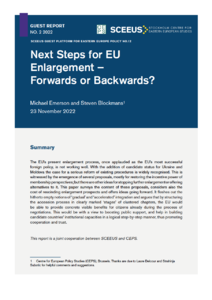
Next Steps for EU Enlargement – Forwards or Backwards?
The EU’s present enlargement process, once applauded as the EU’s most successful foreign policy, is not working well. With the addition of candidate status for Ukraine and Moldova the case for a serious reform of existing procedures is widely recognised. This is witnessed by the emergence of several proposals, mostly for restoring the incentive power of membership perspectives; but there are other ideas for stopping further enlargement or offering alternatives to it. This paper surveys the content of these proposals, considers also the cost of rescinding enlargement prospects and offers ideas going forward. It fleshes out the hitherto empty notions of ‘gradual’ and ‘accelerated’ integration and argues that by structuring the accession process in clearly marked ‘stages’ of clustered chapters, the EU would be able to provide concrete visible benefits for citizens already during the process of negotiations. This would be with a view to boosting public support, and help in building candidate countries’ institutional capacities in a logical step-by-step manner, thus promoting cooperation and trust.